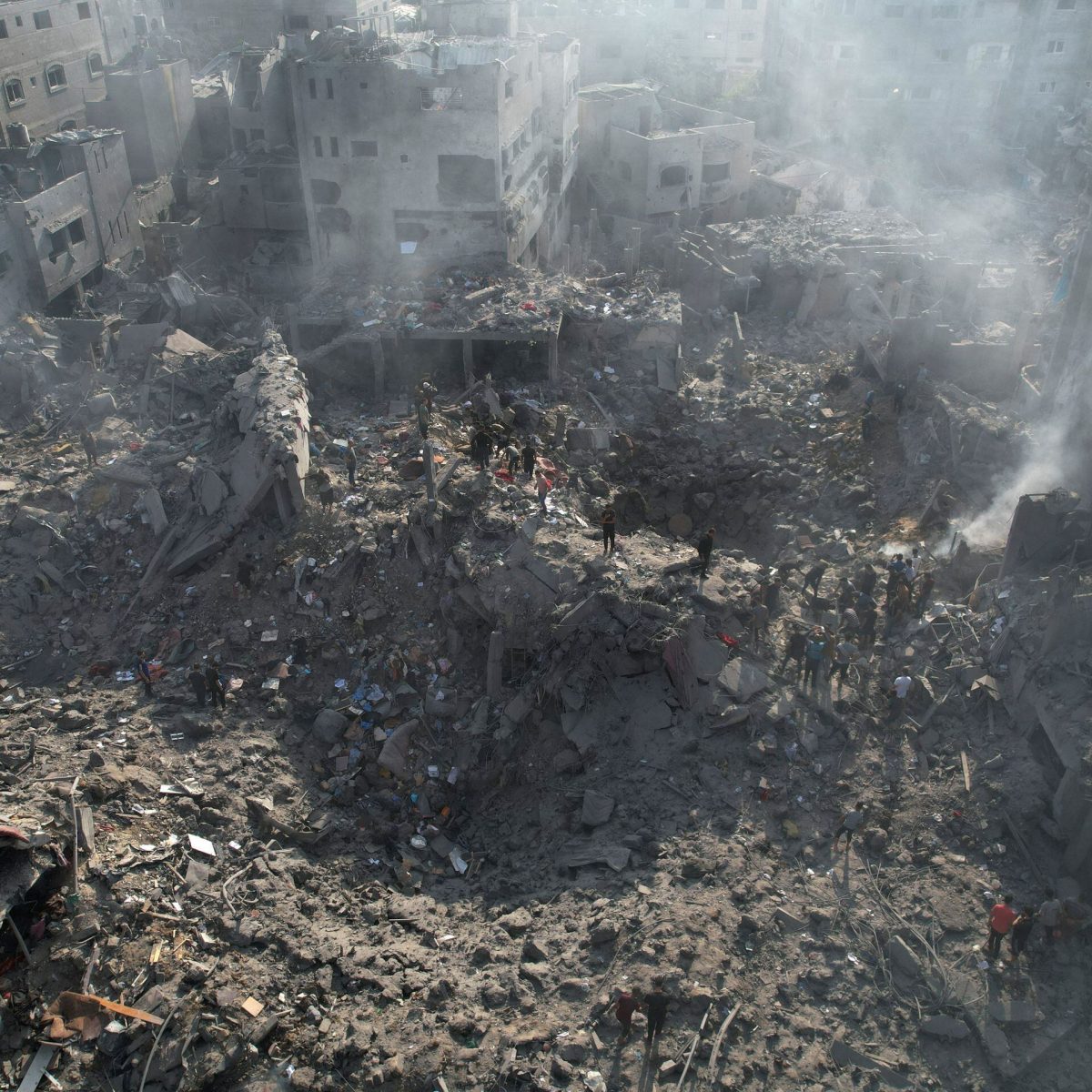GAZA/JERUSALEM, (Reuters) – Twenty-four Israeli soldiers were killed in Israel’s worst day of losses in Gaza, the military said today, as its forces encircled southern Gaza’s main city, trapping Palestinian residents trying to flee.
Spokesman Rear Admiral Daniel Hagari said 21 soldiers were killed when two buildings they had mined for demolition exploded after militants fired at a nearby tank. Earlier, three soldiers were reported killed in a separate attack in southern Gaza.
“Yesterday we experienced one of our most difficult days since the war erupted,” Israeli Prime Minister Benjamin Netanyahu said. “In the name of our heroes, for the sake of our lives, we will not stop fighting until absolute victory.”
The Israeli Defence Forces (IDF) had on Monday launched a major operation to seize remaining parts of Khan Younis, the main city in the south of the enclave, which is sheltering hundreds of thousands of displaced Palestinians.
“Over the past day, IDF troops carried out an extensive operation during which they encircled Khan Younis and deepened the operation in the area,” the military said. “Ground troops engaged in close-quarters combat, directed strikes, and used intelligence to coordinate fire, resulting in the elimination of dozens of terrorists.”
Israel tanks, advancing west across the crowded city towards Mediterranean, shut the last road out towards the coast on Tuesday, blocking the escape route for civilians trying to flee southwest towards the Egyptian border, residents said by phone.
“I am trying to leave for Rafah but the tanks are now very near to the coast and are firing toward the west,” said Shaban, 45, an electrical engineer with four children. He said he still hoped to evacuate his family to the north.
At least 195 Palestinians were killed in the space of 24 hours, raising the documented toll to 25,490, according to Palestinian health officials, who say thousands more dead are feared lost in the rubble.
Palestinian officials said the advancing Israelis had blockaded hospitals, making it impossible to reach the dead and wounded.
At the European Hospital in Khan Younis, Ahed Masmah brought in five corpses, piled on a mattress on his donkey cart.
“I found them face-down in the street,” he said. “I did a good thing and brought them in.”
Bodies were being buried in the grounds of Khan Younis’s main Nasser hospital because it was unsafe to go out to the cemetery. Another hospital, Al-Khair, was stormed by Israeli troops who arrested staff, according to Palestinian officials.
Al-Amal Hospital, run by the Palestinian Red Crescent, was unreachable. The Red Crescent said a tank shell had hit its headquarters on the fourth floor, a civilian had been killed at the entrance and Israelis were firing from drones on anyone who moved nearby, making it impossible to dispatch ambulances.
Israel says Hamas fighters operate in and around hospitals, making them legitimate targets. Hospital staff and Hamas deny this.
‘GRAVEYARD FOR THE OCCUPATION’
The Israeli losses announced on Tuesday were celebrated as a victory by Palestinians.
“The resistance said it is going to make Gaza a graveyard for the occupation, and this is what is happening,” said Abu Khaled, sheltering in a school in Deir al-Balah, one of the few areas yet to be stormed by Israeli forces. “The more they stay, the more we will suffer for sure – but the more they will suffer too.”
Israelis spoke of the losses as a necessary sacrifice in a war against Hamas fighters who attacked Israeli towns on Oct. 7, killing 1,200 people and capturing some 250 hostages, more than 100 still held in Gaza.
“You know, it’s our sons, it’s our brothers, it’s terrible – but we’ve got to do what we’ve got to do so that Oct. 7 doesn’t happen again,” said Blina Rhodes on the street in Jerusalem. “You have to get rid of Hamas and make Gaza safe for us. Otherwise, we have no place to live.”
Israel has vowed to wipe out Hamas, which is sworn to Israel’s destruction and has controlled Gaza since 2007. Since Israel launched its ground assault in October, nearly all Gaza’s 2.3 million people have lost their homes, most now penned into towns just north and south of Khan Younis.
Sami Abu Zuhri, head of the political office of Hamas in exile, said the Israeli losses were proof that the armed wing of Hamas was only getting stronger, and “the American and Israeli goal to get rid of Hamas or weaken it is not possible”.
“We call on the American administration to stop this pointless policy and stop betting on the possibility of weakening or finishing Hamas,” he said by phone from an undisclosed location.
Though the war still has overwhelming public support in Israel, discontent is emerging with Netanyahu’s strategy – committed to the total annihilation of Hamas but with only vague discussion of what should follow and no talk since the end of November of a ceasefire to free hostages.
Since last week, Netanyahu has publicly vowed never to allow an independent Palestinian state, disavowing the decades-old bedrock of Middle East policy of Israel’s main ally, Washington.
Relatives of hostages still held in Gaza have called for more effort to bring them home, even if that means reining in the war. Some burst into a parliamentary committee hearing on Monday.
Last week, a member of Netanyahu’s war cabinet, former military chief-of-staff Gadi Eisenkot, whose own soldier son was killed in Gaza last month, said the campaign had yet to destroy Hamas and no military operation could free the hostages.
The conflict has been accompanied by unrest elsewhere in the Middle East where armed groups allied to Israel’s arch-foe Iran operate, including Lebanon, Iraq, Syria and Yemen, where the Iran-aligned Houthi movement has attacked ships in the Red Sea. The United States and Britain, which have retaliated against the Houthis this month, carried out more strikes overnight.









